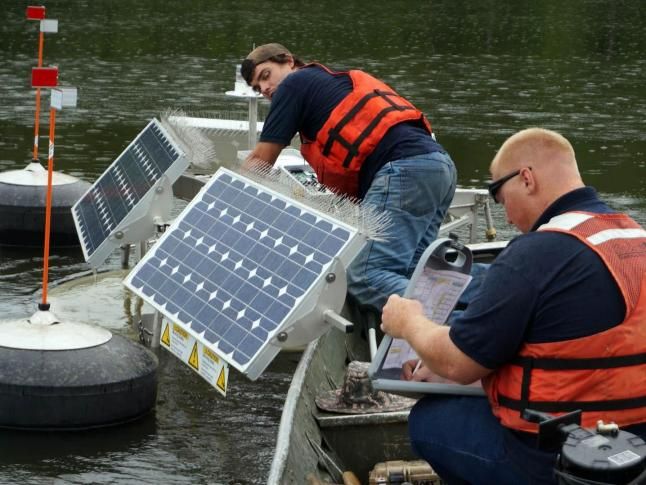Environmental commission rejects revised SolarBee report

Environmental officials on Wednesday unanimously rejected a report from state regulators that downplayed criticism of in-lake measures to control water pollution, including the giant, solar-powered mixers deployed in Jordan Lake.
A committee of the Environmental Management Commission voted instead to approve an original report from the Department of Environmental Quality that concluded devices such as SolarBees wouldn't be effective at combating algae growth caused by nutrient runoff from cities, homes and farms.
DEQ yanked the original report soon after it was posted online in March, saying it was an incomplete draft. In it, DEQ staffers concluded that SolarBees weren't likely to improve water quality in Jordan Lake, a drinking water source for 300,000 people in central North Carolina. Regulators also concluded that no single or combined strategy using in-lake technologies looked feasible and that the best option would be strategies to reduce nutrient runoff.
The new version of the report revised those original conclusions, noting the usefulness of SolarBees and other in-lake measures are "either presently uncertain (including one under evaluation) or unlikely, depending on the measure."
Hours after the new version was released last week, DEQ Secretary Donald van der Vaart announced he was ending the $1.3 million SolarBees project, despite a $1.5 million extension from state lawmakers last fall.
Rich Gannon, a section chief in the Division of Water Resources, told the EMC's Water Quality Committee on Wednesday that the revised report included a number of updates, including the removal of "sweeping types of judgments" and content not requested by the General Assembly.
"Staff saw this as an opportunity to improve the content of the report," Gannon said.
The May report does point out that data show "no significant change in water quality" in areas where the SolarBees are working and notes a lack of large-scale testing with the other measures.
But committee members said the original report was far more clear.
"I find the information removed helped me understand the process," member Larry Raymond said. "There was a lot removed I thought was of value."
With the committee's vote, the full commission will decide Thursday whether to approve it for submission to the General Assembly, where it was originally due April 1.
Environmental groups, which have criticized DEQ leaders for politicizing the report to avoid measures to tackle runoff upstream, praised the committee's decision. They've long pushed to implement cleanup measures known as the Jordan Lake Rules, which have been in limbo amid continued opposition from developers since legislation created them in 2009.
"The legislature should now have a pretty clear picture that no in-lake technology is going to be better than the Jordan Lake Rules at cleaning up nutrient pollution," Dustin Chicurel-Bayard, spokesman for the North Carolina Sierra Club, said.
The committee also unanimously rejected a separate DEQ report on waterway buffers the agency had revised, voting to approve an original version instead. Such buffers protect state streams and rivers from certain types of developments by mitigating pollution but have been criticized by developers as overly restrictive regulations that slow growth.
DEQ Assistant Secretary for the Environment Tom Reeder shrugged off the rejection of his agency's revised reports, saying it was the commission's prerogative.
"They're free to make their own decisions," Reeder said. "That's the way government works."
Although he said it had been a while since he reviewed the changes in the water pollution report, he defended the revised version as closer to what state lawmakers asked for. The original, Reeder said, focused too much on SolarBees, which were at the time still being tested.
With the SolarBee project dead in the water, Reeder said it would be "premature" to speculate about the future of the Jordan Lake Rules – a decision he said lies with the legislature.
To make that decision, Water Quality Committee Vice Chairman Steve Tedder said state lawmakers need the best evaluation about what works and what doesn't. That's why he said he was glad to see the group go with a report that reflected clear and factual conclusions.
"It just says the commission did its job," Tedder said.









